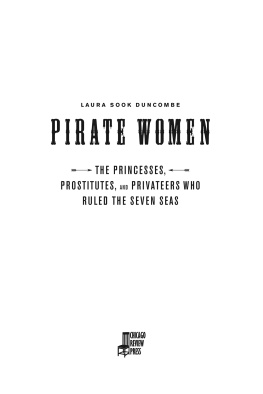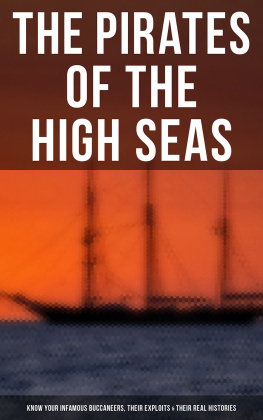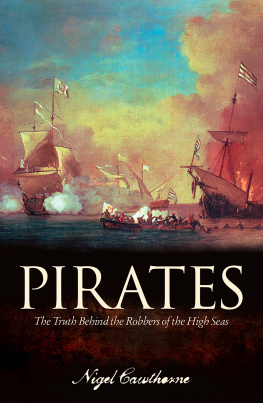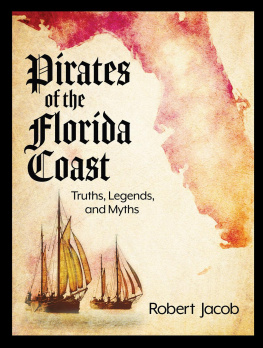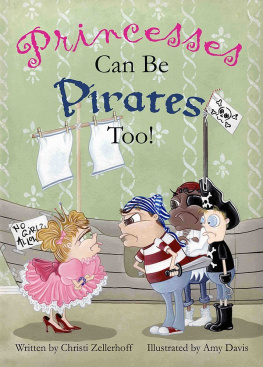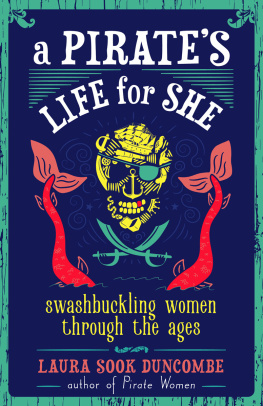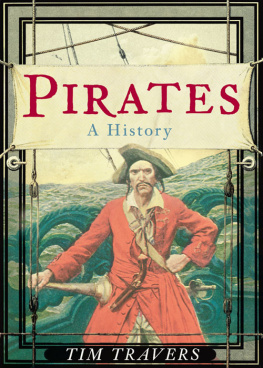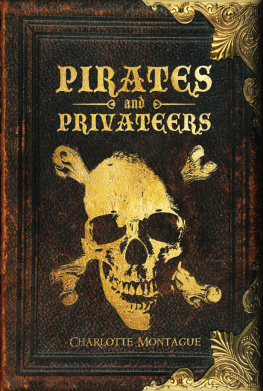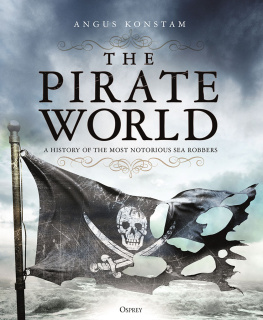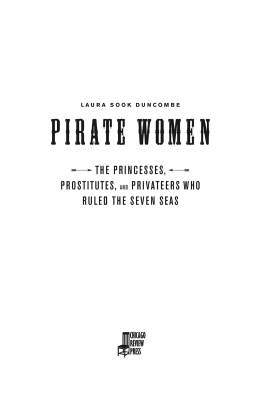Introduction
F OR AS LONG AS there has been a sea to sail upon, there have been pirates. Modern scholarship claims they have played an enormously important role in shaping world history. They have been called raiders, sea dogs, buccaneers, freebooters, corsairs, bandits, and many other names in many languages. They have sailed throughout every millennium. They hail from every inhabited continent, in every age, color, and creed imaginable. What unites these vastly diverse people across time and space? Is it the peg legs and eye patches? The rum and the parrots?
These common tropes pervade modern depictions of piracy, but true piracy is so much more than these cartoonish trappings. The heart of piracy is freedomfreedom from society, freedom from law, and freedom from conscience. Pirates capture peoples hearts as easily as they capture their prey because they actually do what many people only dream of doingthey cast off home and comfort for a chance at life outside societys confines. A person who does not condone a pirates criminal actions can still be inspired by her courageous and adventurous spirit.
No, that was not a typo: pirates have always answered to she as well as he. (During the periods covered in this book, the gender binary was still firmly in place. As far as I am aware, all the pirates in this book identified as female. My use of she reflects the available research on these pirates and is in no way meant to invalidate other expressions of gender.) Female pirates have fought alongside and, in some cases, in command of their male counterparts since ancient times, despite the widespread belief that women at sea were bad luck. For a woman to cast off her petticoatsand often her identityand take up arms seems impossible, but many persevered. Yet history largely ignores them, and most people are ignorant of their existence.
So who were these women pirates? From royalty such as Queen Teuta to the penniless orphan Gunpowder Gertie, they ran the gamut from princess to pauper. Some were barely out of their teens, such as Sadie the Goat, while others such as Sister Ping were older when they started their careers. Grace OMalley pirated for many years, and Margaret Jordan participated in only a single piratical venture. Sayyida al-Hurra took to the sea to revitalize her community, while Jacquotte Delahaye sought revenge for her parents deaths. Pirate women existed essentially everywhere male pirates did, in nearly every major period of pirate history. They had little in common with each other, except for their gender and their desire to escape the traditional role that their gender dictated.
If pirate women are so prevalent in history, why are they so seldom known? They had to fight at least twice as hard as male pirates to make it to sea and prove their worth, so surely they are doubly worthy of study. Yet all too often, they are left out of the piratical discussion. With the exception of Anne Bonny and Mary Read, and more recently Grace OMalley, they are given short shrift by history, identified only by nicknames or titles if they are mentioned at all. Of the numerous pirate books on the market, precious few discuss women, and almost none hold women pirates as their focus. David Cordingly, a leading pirate scholar, devoted an entire book to women (originally titled Women Sailors and Sailors Women before being renamed the less-patronizing Seafaring Women). He expressed disbelief that Mary Read and Anne Bonny actually lived aboard a pirate ship and questioned how a woman could tolerate the rough working conditions at sea. When even a historian covering women sailors refuses to acknowledge that women pirates existed, there is a problem in the field.
Women pirates are often absent in historical discussion because their very existence is threatening to traditional male and female gender roles. Pirates live outside the laws of man, but women pirates live outside the laws of nature. Women pirates are left out because they dont fit nicely into the categories of normal women or traditional womens virtues. As historian Jo Stanley puts it, female pirates like to be on top... and maraud fiercely where maidens should step sweetly. They are social outragesand the embodiment of womens terrifying power. They upset the balance of power in a patriarchal society and for that reason are not to be discussed, let alone celebrated, by traditional historians.
Pirate women also interfere with mans storied and complex relationship with the sea itself. Water is primal; life cannot exist without it. Many creation myths feature water, and its no wonderhumans are surrounded in water-like amniotic fluid in the womb before birth. The sea, which was here before man and cradles man, is like a mother to sailorsa woman. It is connected to the moon and tides, which have also been associated with women all the way back to the Greek goddess Artemis. Ernest Hemingway opines in his famous novel The Old Man and the Sea that [the main character] always thought of the sea as la mar which is what people call her in Spanish when they love her. Sometimes those who love her say bad things of her but they are always said as though she were a woman.... The old man always thought of her as feminine and as something that gave or withheld great favors, and if she did wild or wicked things it was because she could not help them. Mermaids and sirens, legendary creatures who lure men to their deaths on the sea, are traditionally female as well. Ships are often named for women, and women are frequently featured on the bows of boats as buxom figureheads. Undiscovered islands on the sea are virgin and are conquered by colonizing men. For man, the sea and things associated with it are feminine, ripe for male subjugation or, at the very least, male adventure. The feminine sea is an exclusively male domain, where men can prove their bravery or seek their fortune. Adding women to this equation dilutes the established gender binary and threatens the near-sacred relationship between sailor and the sea.
For these and countless other reasons both conscious and unconscious, male historians often exclude women pirates from their work. Unfortunately for women pirates, the vast majority of history has been recorded byand from the perspective ofmen. Scholar Dale Spender explains that women have been kept off the record in most, if not all, branches of knowledge by the simple process of men naming the world as it appears to them.... They have assumed their experience is universal, that it is representative of humanity.... Whenever the experience of women is different from men, therefore, it stays off the record, for there is no way of entering it into the record when the experience is not shared by men, and men are the ones who write the record. Deidre Beddoe echoes that sentiment, saying that recorded history is the history of the men and male affairs... wars, diplomacy, politics, and commerce. Indeed, without the efforts of women historians such as Anne Chambers, Dian Murray, and Joan Druett, much of the existing knowledge of women pirates would not have come to light. As long as men control the narrative, women pirates will be mostly left out.

